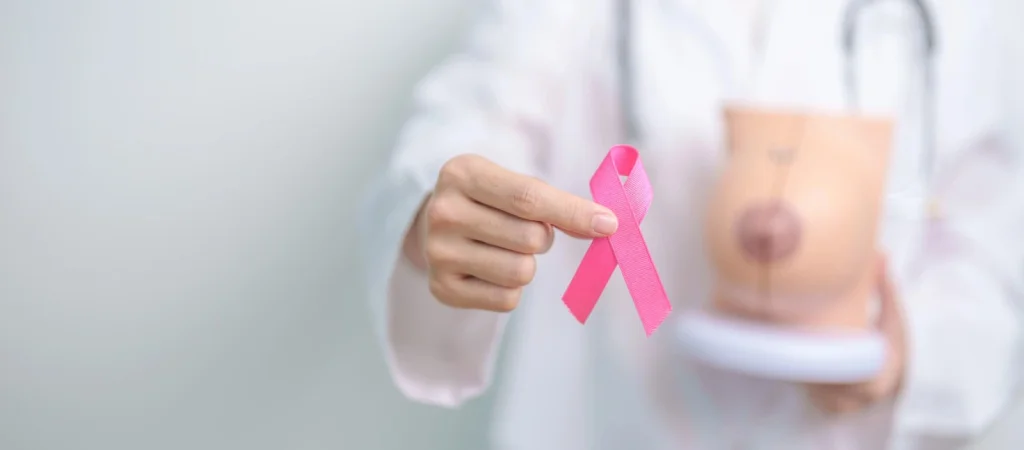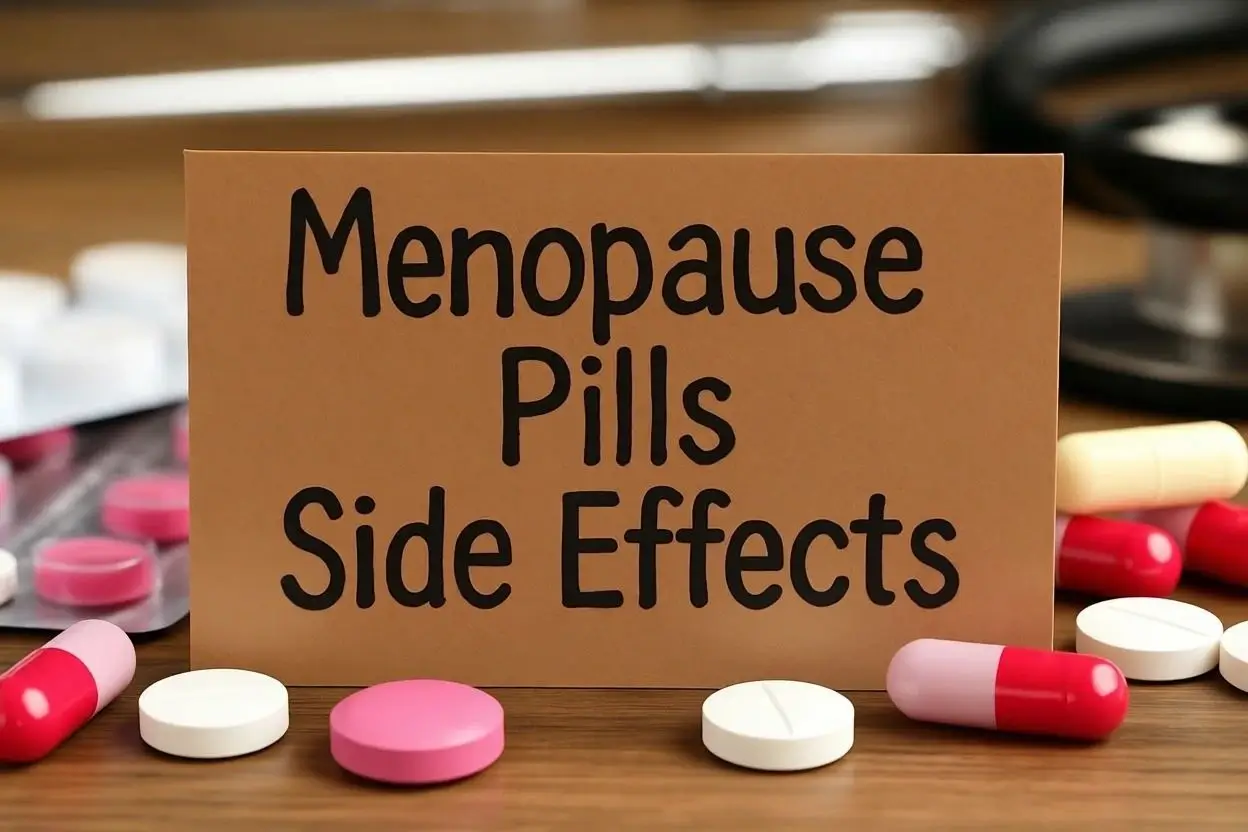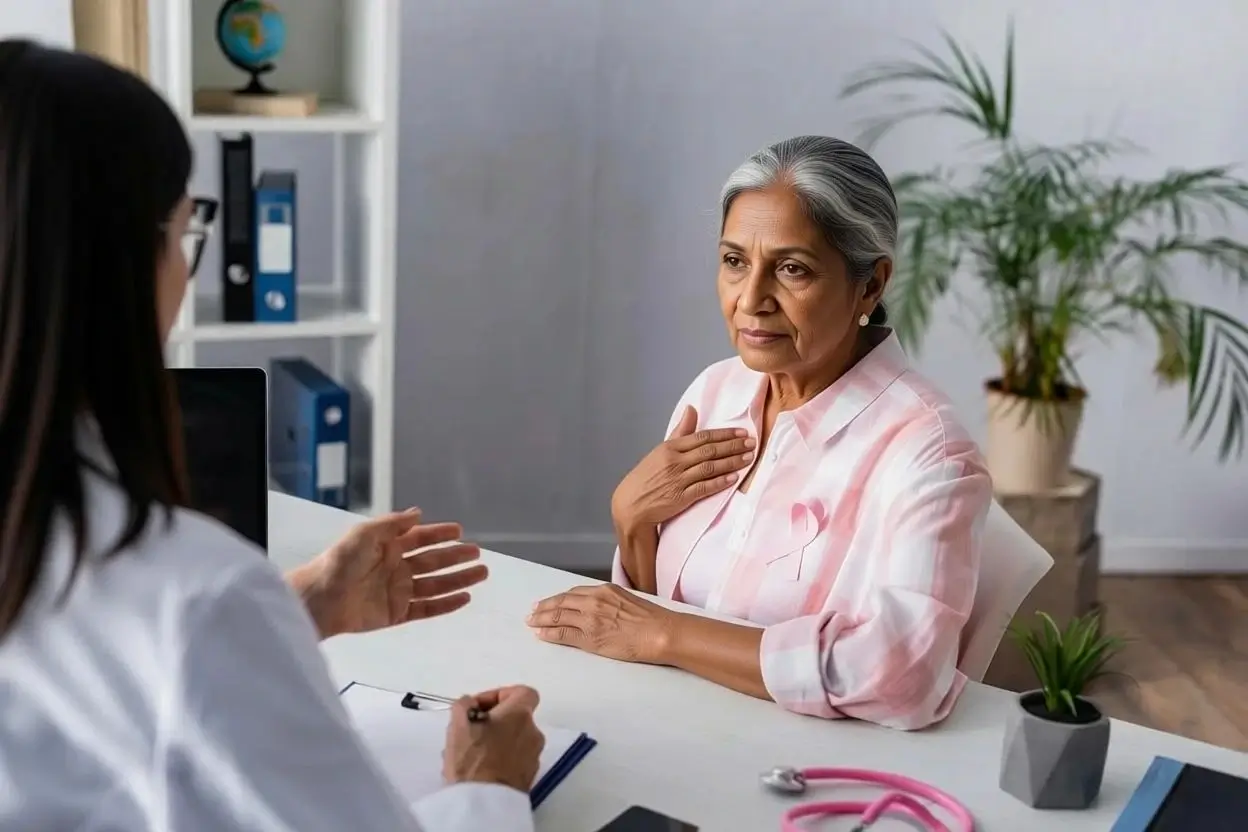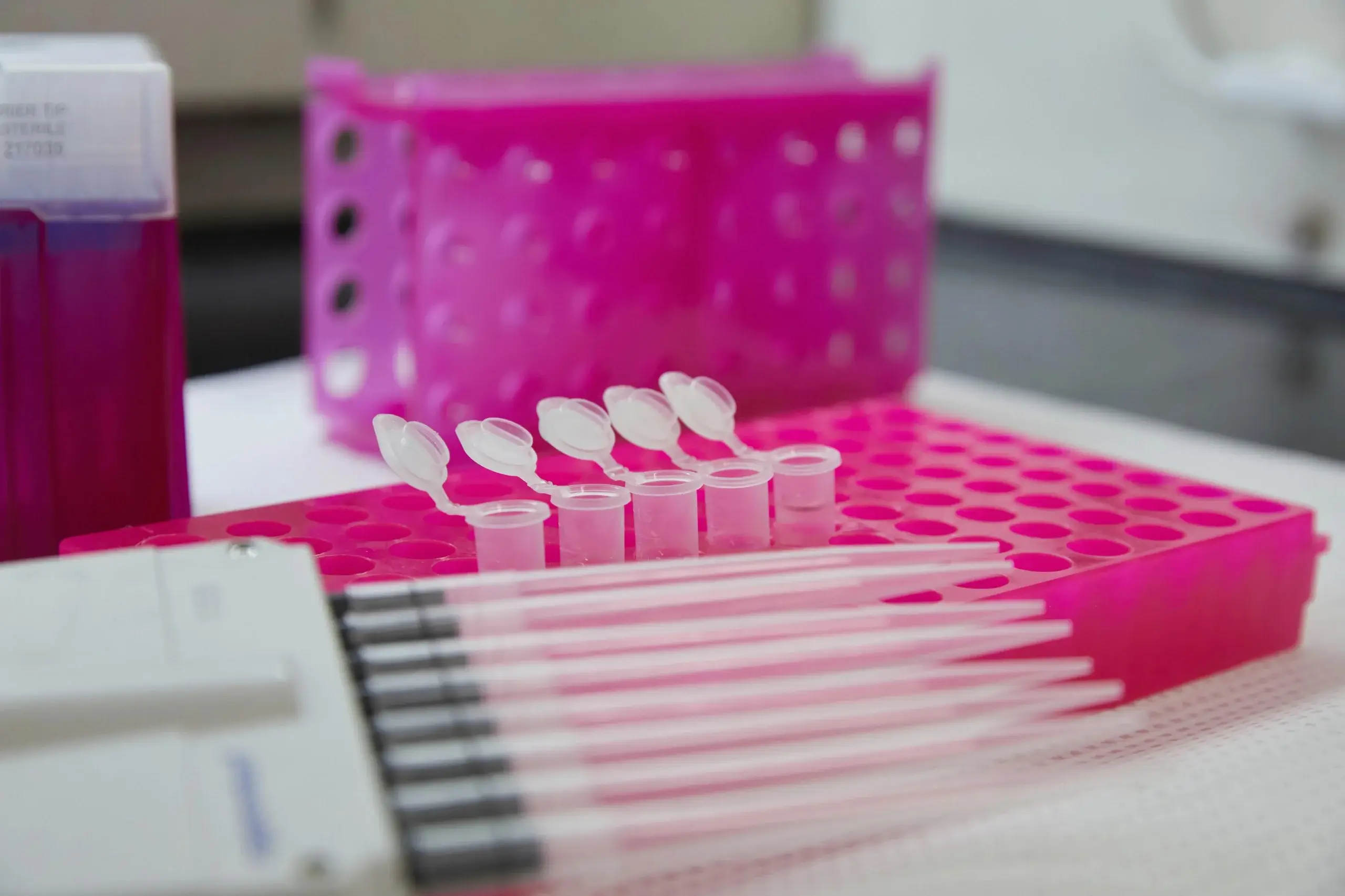In other words: yes, it is advanced compared to early stage breast cancer — but crucially, it is still treatable, and many women go on to live full, rich lives.
The emotional tsunami behind the diagnosis(!)
You might have expected the word “cancer” and had some sense of fear. But when you hear “stage 3”, there’s often more: a rush of questions, shock, grief, anger, maybe guilt, maybe relief that “at least it’s not stage 4”… and also confusion. Because you didn’t know what you didn’t know.
You may hear from your body things you weren’t ready for: a lump, swelling, skin changes, heaviness, something that feels “off”. You might find yourself saying, “Why didn’t I notice this sooner?” or “How did I miss it?” And you might feel surreal, as though you’re watching someone else’s life for a moment.
And then there’s the deeper, quieter ache: the fear of what this means for your body, for your future, for your relationships, for your sense of self. Suddenly you are not just experiencing the world as “you”, you are experiencing it as “you with stage 3 breast cancer”. That can feel distracting, alien, overwhelming.
So let’s gently walk through what that means — what you might expect, what you might feel, and how you might support yourself (or a friend) through this.
What the body might show (and what you might feel)?
Because stage 3 breast cancer has spread beyond the simplest forms, the symptoms can be more apparent. But don’t rely just on visible signs — listen to your body, your instinct, and your gut. Here are some signs that may accompany this stage:
A breast lump that’s larger, or growing more quickly, or feels different than benign lumps. National Breast Cancer Foundation
Swelling or lumps in the under-arm (axillary) or near the breastbone lymph nodes. Cancer Research UK
Changes to the skin of the breast: thickening, dimpling (“orange peel” texture), redness, or ulceration (in more advanced local spread). Macmillan Cancer Support
The tumour may have spread into the tissues of the chest wall or the skin of the breast — which may cause pain, discomfort, or even visible changes. City of Hope Cancer Treatment Centers
Emotionally, you may feel:
Shock and fear — the “what now?” question that echoes.
Guilt — perhaps for not detecting it earlier, or for affecting your loved ones.
Loss of identity — your body feels changed, unfamiliar.
Exhaustion — the mental toll alone is heavy.
Hope mixed with uncertainty — yes, there is treatment, yes there is possibility, but you may be living in the grey spaces of waiting and reacting.
Treatment is complex — and hopeful!!
Good news: Stage 3 breast cancer has come a long way in terms of treatment advances. Yes, the path is more intense than for early stage, but many women come out the other side with life beyond cancer.
Typical treatment strategies include multimodal therapy — meaning a combination of approaches such as chemotherapy, surgery, radiation therapy, hormone (endocrine) therapy, targeted therapies (for HER2 positive cancers), and sometimes newer immunotherapy options. Cancer.org
Often, treatment is sequenced:
Neoadjuvant therapy (before surgery) to shrink the tumour and affected lymph nodes, making surgery more feasible. Kolhapur Cancer Centre
Surgery — which may be breast-conserving or a mastectomy, depending on the size and spread. National Breast Cancer Foundation
Radiation therapy post-surgery to reduce risk of local recurrence.
Systemic therapy (hormonal, targeted) depending on cancer subtype (ER/PR positive, HER2 positive, triple negative, etc.).
What affects the pathway:
The subtype of breast cancer you have (hormone receptor status, HER2 status).
The grade of the tumour (how abnormal its cells look, how quickly they’re dividing).
Your overall health, age, preferences, and support system.
So yes — while the path can be tough, it is not hopeless. Treatment is effective for many, and survival rates are significantly better than many assume.
What about survival? What are the numbers and what do they really mean?
It’s important to know: when we talk about survival statistics, we’re talking about large groups of people, years of data, and averages. They can’t tell you your outcome, but they can give hope, context, and question prompts for your care team.
For stage 3 breast cancer: data suggests that 5-year relative survival (meaning percentage of people alive 5 years after diagnosis compared with the general population) is quite high if treated. For example, one large US database says about 87% for regional disease (which includes stage 3) according to one source. National Breast Cancer Foundation Another Australian source quotes about 80.6% in their dataset. NBCF
What can you take from that?
Many women with stage 3 breast cancer are living 5 years and beyond — and many much longer.
The number is not a guarantee, but it is a strong message: treatment works, and survival is very real.
Your personal prognosis will depend on many factors: your subtype, how early treatment started, how you respond to therapy, your general health and support.
The less‐spoken truths: the impact on life, body, identity & relationships
Here’s where the conversation often goes quiet: beyond the medical, there is the human, lived experience. And that’s where the “reality no one expects” lives. Because life with stage 3 breast cancer is not just about surgery, chemotherapy, scans — it’s also about the self, the body, the relationships, the future.
Body & identity: Your body has changed or will change. You may have surgery that alters your sense of femininity, your chest shape, your skin texture; you may have hair loss, fatigue, changes in sensation, perhaps menopausal effects triggered by treatment. The mirror may feel unfamiliar. You may feel disconnected from your body — the sense of “this used to be me” and “this is me now” can be jarring.
Relationships: Your relationships with your partner, your friends, your children, even your work may shift. You may be “the patient” rather than “the me” in some interactions. You may feel like you need to protect loved ones, hide your fear. Or you may lean on them deeply and find new closeness. Both are valid.
Emotions: Fear of recurrence, fear of letting loved ones down, fear of the unknown. But also gratitude for each moment, the clarity of what matters, the possibility of deeper intimacy and meaning. Anxiety may live alongside hope. Some days you feel warrior-strong; other days you just want to hide.
Sexuality & intimacy: This is a big one — and often overlooked. A diagnosis of stage 3 breast cancer can affect your sense of sexual self: how you view your body, how you feel desirable, how you connect with your partner (or yourself). Fatigue from treatment, hormonal changes, body image issues — they all play a role. It may feel frightening or unfamiliar to reclaim your body’s pleasure, your sense of intimacy. But it’s possible, and it’s important. Because your life beyond cancer still includes being seen, being loved, and feeling sensual if you choose to.
Quality of life: Treatment may feel relentless. Scans, appointments, side-effects, hospital visits. You may feel your life on hold. But one of the greatest realities no one expects is how deeply you will learn what “quality” means to you. Maybe it’s a slow morning, maybe it’s holding someone’s hand, maybe it’s simply walking without fear. These count. These matter.
What helps? Practical support & self-care for stage 3 breast cancer
As a friend, here are things I would tell you — things I wish someone had told me or someone I love. Some are medical-ish (so loop in your doctor), others are heart-ish.
Ask questions. Don’t be afraid. “What does stage 3 mean in my case?” “What subtype is my cancer?” “What is the goal of treatment? (Curative? Remission?)” “What are the side-effects we expect, and how will we manage them?” The more you understand, the more empowered you become.
Build your team. Your oncologist, surgeon, radiation doctor, nurse, counsellor. But also yourself, your advocate, your body listener. You don’t just have to follow instructions — you get to participate. Ask for second opinions if you need. Because your body, your life, your choices matter.
Take care of your body — gently. This might mean:
Prioritizing rest when needed.
Gentle movement (even a walk, yoga, stretching) as your strength allows.
Nourishing foods — you don’t have to be perfect, but your body will thank you for kindness.
Listening to your body’s signals: fatigue, pain, emotions. Don’t push yourself into “I have to be strong all the time.” It’s okay to give in.
Allow your emotions. This is big. Because we often think we must “stay positive” — yes, positivity is useful, but that doesn’t mean you can’t feel sadness, anger, confusion, fear. Let them in, process them, maybe write them, talk them, cry them. Emotional healing matters just as much as physical healing.
Connect — you don’t have to be alone. Talk to friends, join support groups, find other women who are walking this path. Your story may be unique, but your heart doesn’t have to carry this in isolation. Shared stories bring hope, reduce loneliness. You may find strength in someone else’s journey, and you may become that strength for someone else too.
Focus on what you can control — and let go of what you can’t. You can’t always control how your cancer behaves, but you can control how you face it, how you treat your body, how you give yourself love. You can choose to live, to find meaning, to laugh, to hope.
Reclaim your sensuality and self-care. This might feel odd — but it’s so important. Your body is yours. Whatever that body shows, whatever the changes — your sense of self, your softness, your desire, your pleasure matter. Talk to your partner (if you have one), talk to yourself. Therapy, intimacy coaching, even gentle touch, mindfulness. You deserve to feel sensual, desired, embodied.
The words I hope you hear..
If I were sitting with you right now, across a cup of tea or on a quiet evening walk, I’d want you to hear these from me:
You are so much more than this diagnosis.
Your body is courageous. It has spoken its truth, and now you are listening — that is strength.
It’s okay to feel scared. It’s okay to feel unsure. It’s okay to ask for help.
There is hope. The numbers show it. The women living beyond stage 3 show it.
You deserve joy. You deserve intimacy. You deserve tenderness. You deserve a life that feels rich and meaningful.
This is not the end of your story. It’s a new chapter — and you have a say in how it unfolds.
Looking ahead: living beyond stage 3
Treatment might take months, maybe more. There may be times you feel like a warrior and times you feel like you’re just surviving. Both are valid. After active treatment, there might be follow-ups, surveillance, scans. It may feel like you live in “between times” — between what was and what will be. That’s okay.
What many women find is that after this experience their priorities shift. The fluff falls away. The small things matter. Intimacy with partner, closeness with friends, being in your body in a new way. Maybe you choose to speak your truth more, maybe you choose to say yes to what brings light, no to what drains you.
And yes — you might still live with risk. Recurrence is possible. But living in risk isn’t the same as living in fear. With support, with awareness, with connection, you can live boldly, beautifully.
Final gentle reminder
Diagnosis: Stage 3 breast cancer. It’s heavy, it’s real, it’s scary. But it is not hopeless. The reality no one expects is not just the fear, but also the beauty of human strength, of soft courage, of connection, of rediscovery. If you’re standing here now — take my virtual hand. Let’s walk forward together.
You deserve healing. You deserve pleasure. You deserve a body you know. You deserve a life you love. Let’s believe in the “beyond” — the life after diagnosis, yes; the new self you’re becoming.
If you’re reading this because you’ve been told “stage 3 breast cancer” — breathe. You’re right here. You’re not alone. Let’s talk. Let’s feel. Let’s hope. And let’s live.










